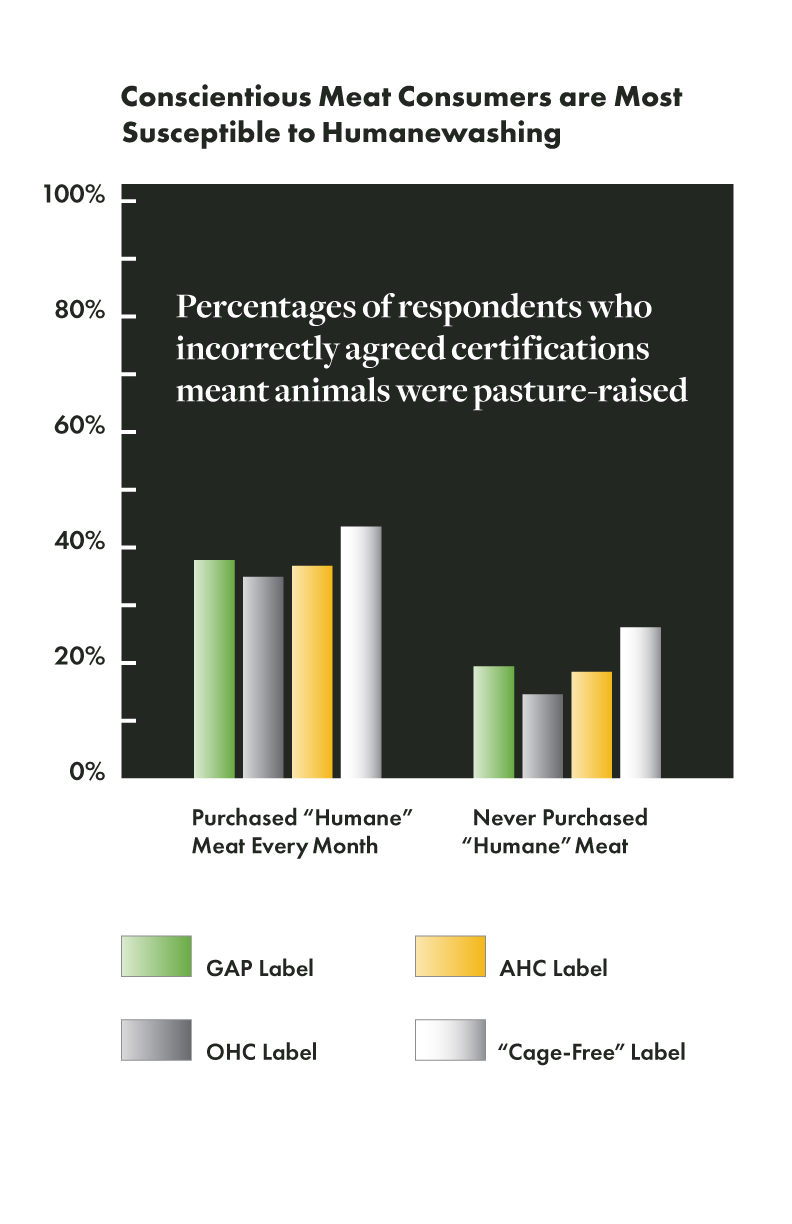Conscientious Consumers Misled by Humanewashing Food Certifications According to New Farm Forward Report Research Shows Certifications Are Out of Sync with Shoppers’ Expectations




 Portland, OR
|
December 16, 2021 02:20 PM Eastern Standard Time
Portland, OR
|
December 16, 2021 02:20 PM Eastern Standard Time
American shoppers encounter a wide range of welfare claims on animal products, from loosely regulated terms like “humanely raised” and “free range,” to third-party certifications like Global Animal Partnership (GAP). Farm Forward’s new survey is the first of its kind to look at consumer expectations of animal welfare certifications, and its results demonstrate the demand for higher welfare animal products, including chickens who are not genetically modified for fast growth—which GAP has pledged to address. The survey results showed that there is a huge gulf between what consumers expect certifications to mean and what they actually mean. The vast majority of American consumers are impacted by humanewashing: deceptive marketing tactics used by meat producers and retailers to mislead shoppers about animal welfare. Conscientious shoppers who regularly seek humanely raised meat are the most susceptible to the effects of humanewashing.
“All certifications, from the industry-aligned American Humane Certified, to the independent Global Animal Partnership, in our survey fell short of consumers’ beliefs about them,” said Andrew deCoriolis, Farm Forward’s Executive Director. “Many shoppers believed that all of these certifications guaranteed that animals were raised outdoors or weren’t genetically modified, when they don’t. The unfortunate reality is that, today, most certifications are marketing tools for factory farms.”
Key Findings
- Americans largely cannot distinguish between independent certifications and those devised by industry. Survey findings paint a disturbing picture of rampant humanewashing by even the most trusted retailers, like Whole Foods, whose products are GAP-certified.
- Those who reported buying humane-labeled meat more often were also more confused about the meaning of certain labels. For virtually all certifications examined, consumers who purchased humane-labeled products at least once per month agreed with incorrect statements more, often by at least 20 percent, than those who never purchased them.
- There is a stark difference between what consumers believe to be true, what they believe should be true, and what is actually true with GAP, American Humane Certified (AHC), and One Health Certified (OHC) welfare labels.
- On measures like whether animals are raised on pasture, whether animals are genetically modified for rapid growth, physical mutilations, and more, Americans want higher welfare standards on farms and overestimate how much these certifications ensure.

Cage-Free Confusion
Over the past 10 years, hundreds of restaurants, retailers and food companies have committed to shifting toward cage free eggs. Farm Forward found that more than 50 percent of Americans believe that cage-free should mean that hens spend their whole lives on pasture, while 62 percent believed cage-free labels should at least guarantee consistent outdoor access (notably, only 9 percent disagreed with this statement). Regarding what the cage-free label actually guarantees, 38 percent believed it ensures that birds spend their whole lives on pasture, and 47 percent believed they have consistent outdoor access. In reality, cage-free merely refers to the absence of battery cages within an indoor, industrial-scale operation. Consumers expect that the "cage free" eggs and corporate pledges are much more meaningful for welfare than they are.
These findings are particularly concerning when considered alongside the premium prices consumers pay for cage-free eggs that fail to meet their expectations. According to the USDA egg market report (Dec. 3, 2021), the average price for one dozen cage-free eggs (white/brown) was $2.63, versus the average price of one dozen conventional eggs at $0.97. Consumers are paying, on average, two and a half times as much for cage-free eggs expecting them to mean the animal welfare is meaningfully higher than conventional when in many cases, it’s not. In reality, producing “cage free” eggs costs approximately 25% more than conventional eggs, but retailers are banking on consumer misunderstanding of the “cage free” label and charging 200% more.
It’s clear that consumers want hens to be given, at least, access to pasture and expect the “cage free” label to guarantee those standards. Retailers must do more to meet consumer expectations for welfare and animal advocates need to do more to educate the public that the modest improvements in systems like cage free still fall far short of their expectations.
Methodology
Farm Forward’s online survey was conducted by YouGov from September 3 through 7, 2021. The total sample size was 1,219 adults. The figures have been weighted and are representative of all U.S. adults (aged 18+).
Participants were asked a series of questions about three certifications, GAP, AHC, and OHC, as well as the label claims to ascertain their expectations for products bearing these labels as well as their beliefs about what these labels actually mean.
About Farm Forward
Farm Forward works to improve the lives of more than 400 million farmed animals annually. Since 2007, its mission has been to end factory farming by changing farming, changing policy, and changing the stories told about animal agriculture.
Contact Details
Susan Peters
Company Website
